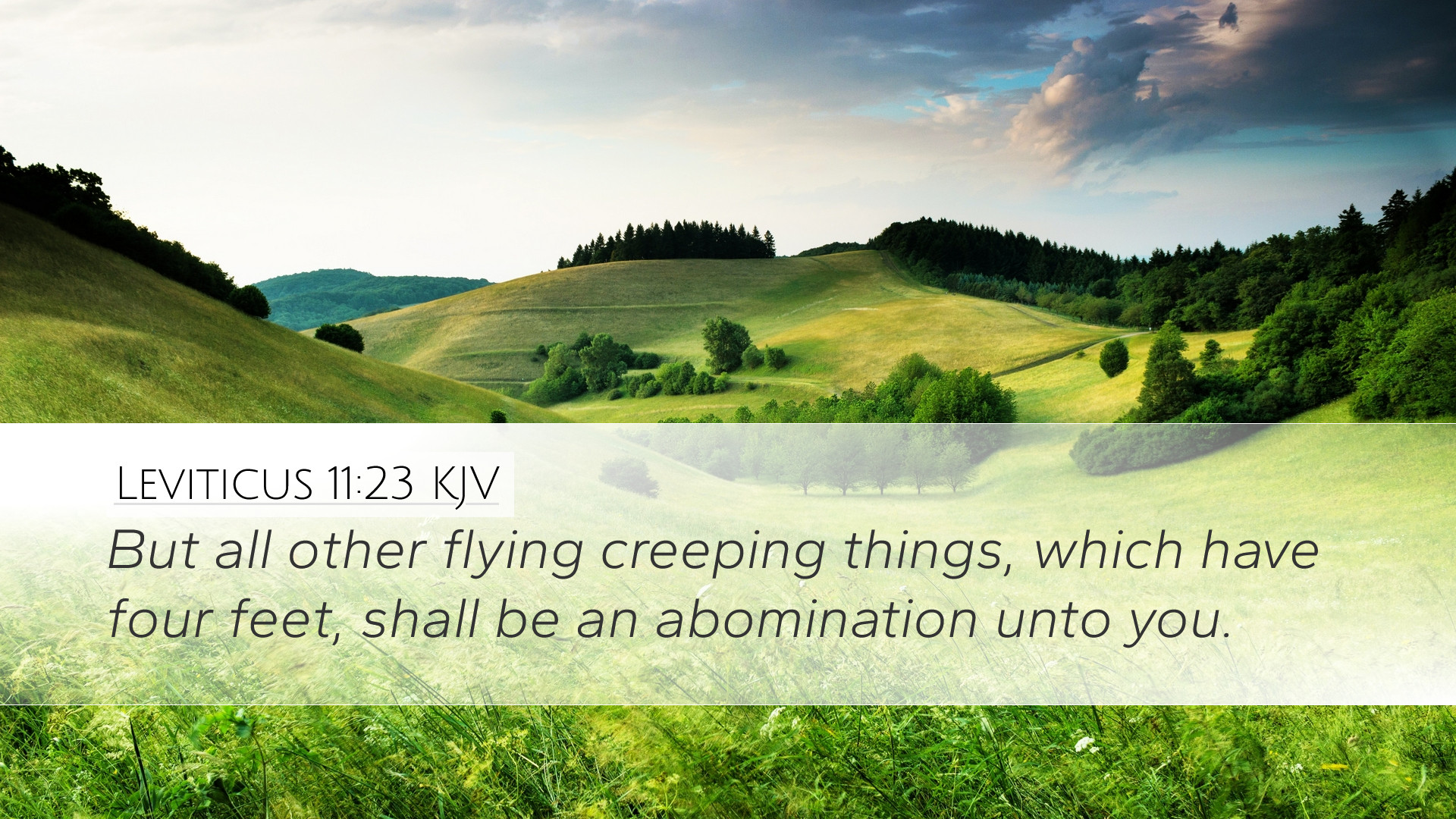Commentary on Leviticus 11:23
Verse: "But all flying insects that walk on all fours are detestable to you." (Leviticus 11:23)
Introduction
The dietary laws of Leviticus provide essential insights into the holiness and separateness that Israel was called to embody as a nation chosen by God. Leviticus 11 focuses on clean and unclean animals, and Leviticus 11:23 addresses a specific category of flying insects that walk on all fours. This commentary synthesizes insights from various public domain sources, including Matthew Henry, Albert Barnes, and Adam Clarke, to deepen understanding and application of this verse.
Contextual Background
To fully appreciate Leviticus 11:23, an understanding of the Levitical laws is paramount. These laws were designed to shape the identity of the Israelites and were both ritualistic and ethical in nature. They served to distinguish God’s people from surrounding nations by imposing a divine standard of cleanliness and holiness.
Significance of Clean and Unclean
As emphasized by Matthew Henry, cleanliness according to these laws reflects the purity that God expects from His people. The distinction between clean and unclean is not merely about dietary restrictions but serves a broader purpose in helping the Israelites comprehend their relationship with a holy God.
Exegesis of Leviticus 11:23
In this verse, the phrase "flying insects that walk on all fours" can cause confusion, as most insects do not walk on four limbs. Albert Barnes points out that this phrase likely includes insects that have more than two legs, perhaps indicating those that can be seen as creeping or crawling rather than flying. This categorization emphasizes God’s command for distinction in what is clean and unclean.
The Concept of Detestability
Henry discusses the term "detestable," noting that it reflects the severity with which God views certain creatures. This perspective cultivates a sense of reverence towards the Creator's commands and a recognition of God's authority over creation.
Theological Implications
From a theological standpoint, Adam Clarke reflects on how the dietary laws connect to the concept of holiness. The call to avoid detestable things is both a physical and spiritual outlook. This instruction highlights the essential character of God and calls His people to embody His holiness in every aspect of life, including what they consume.
Implications for Worship and Community
The Israelite community's strict adherence to these laws would foster unity and a collective identity deeply rooted in their covenant with God. The practice of understanding these laws as a means of worship is crucial. Barnes posits that such restrictions serve as a reminder of God’s sovereignty and a way for believers to express gratitude and reverence through obedience.
Application for Contemporary Believers
For modern-day believers, the principles derived from Leviticus 11:23 suggest the need for discernment in what they allow into their lives. The detestable nature of certain flying insects can serve as a metaphor for avoiding sin and influences that lead away from a Christ-centered life.
Holiness in Modern Life
Pastors and theologians may draw parallels between ancient dietary restrictions and contemporary practices of holiness. As God's people today, Christians are called not only to reject physical detestability but also spiritual pollution, ensuring that their hearts and minds are focused on God.
- Distinction in Conduct: Emphasizing purity in action and lifestyle choices.
- Community Standards: Encouraging collective responsibility in maintaining spiritual purity.
- Holistic Obedience: Understanding that obedience encompasses both physical and spiritual realms.
Conclusion
Leviticus 11:23 serves as a powerful reminder of God’s call for purity and holiness among His people. Through careful study of this verse and its broader context within the holiness code, as interpreted by venerable commentaries, we find lessons that transcend time. Believers today are invited to reflect on what it means to live in a way that is pleasing to God, recognizing that the principles of the Old Testament are not merely archaic regulations but vital elements of a faithful life in relation to a holy God.


